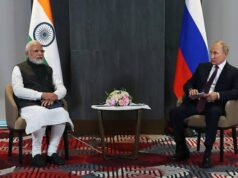Nepal hopes for Chinese finance during Xi Jinping’s visit

President Bidhya Devi Bhandari received him at Kathmandu airport to the sounds of the two countries’ national anthems, played by an army band.
Nepal’s President Bidhya Devi Bhandari walks with China’s President Xi Jinping during a welcome ceremony at the Tribhuvan International Airport in Kathmandu.
Nepal rolled out the red carpet on Saturday for China’s President Xi Jinping but rounded up Tibetans to prevent protests during the first state visit by a Chinese leader in 23 years.
Xi landed following two days of talks in neighboring India, and is expected to use his time in Kathmandu to push Beijing’s controversial Belt and Road infrastructure projects.
Although India has traditionally been Nepal’s main ally, China has intensified its presence in the impoverished Himalayan nation, pumping millions of dollars into projects ranging from roads to hydropower plants.
President Bidhya Devi Bhandari received him at Kathmandu airport to the sounds of the two countries’ national anthems, played by an army band.
China’s official Xinhua news agency early Sunday reported that, after arriving, Xi said he expected “to upgrade China-Nepal relations, enhance connectivity between the two countries and deliver more benefits” to their peoples.
In a signed article published in Nepali newspapers on Friday, Xi said he would use the two-day visit to “renew friendship and explore cooperation with my Nepali friends”.
“It is important that we adopt a strategic and long-term perspective and draw up a blueprint for our bilateral relationship to take it to a new height in this new era,” Xi added.
The International Campaign for Tibet (ICT), a Washington-based pressure group, said at least 18 people were arrested in the days ahead of Xi’s arrival. These included two Nepali shopkeepers selling bags with Tibetan flags or slogans. Fourteen remained in detention on Saturday.
In 1959, Beijing sent soldiers to crush a revolt in Tibet against Chinese rule, leaving the Dalai Lama, Tibet’s spiritual leader, fleeing to India where he remains.
Nepal is home to around 20,000 exiled Tibetans, but under pressure from Beijing the communist government has taken an increasingly hardline stance on their activities.
“There is heavy police presence. It is an intimidating situation. We’ve been asked to stay in,” one Tibetan said, speaking on condition of anonymity.
Nepalese authorities declined to comment.
In 2017, Nepal signed up to China’s Belt and Road initiative, a vast global infrastructure programme, which includes the building or upgrading of highways and airports in the country.
“A trans-Himalayan connectivity network is thus taking shape, which will serve not just our two countries but also the region as a whole,” Xi said in his article.
Landlocked Nepal, sandwiched between India and China, is seeking closer ties and much-needed energy and infrastructure investment from Beijing.
Nepal’s Foreign Minister Pradeep Gyawali said Xi’s visit holds “historic significance” for Nepal.
“Our priority is to create opportunities for Nepal, joining it to China’s development. We are focusing on connectivity between the two countries,” he said.
Although no official announcement has been made, it is expected that the two countries will sign agreements for Chinese investment in highways, tunnels and hydro projects.
High on the agenda is the extension of China’s Kerung railway from the border to Nepal’s capital Kathmandu. There have been warnings over the financial commitments, however.
“Nepal has to be conscious when it reaches the point of financial dealings on these projects and build capacity to negotiate and not fall into debt traps,” said Sudheer Sharma, editor of the Kantipur national daily.
Xi will hold talks with Prime Minister K.P. Sharma Oli and other top leaders and meet with President Bhandari.




